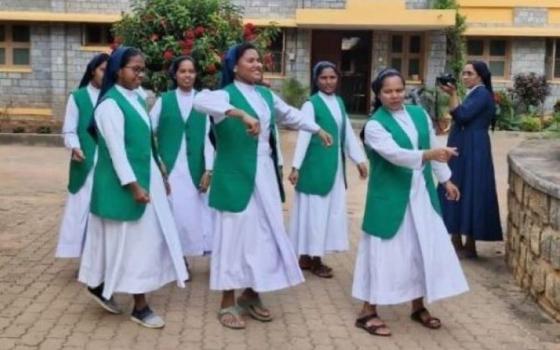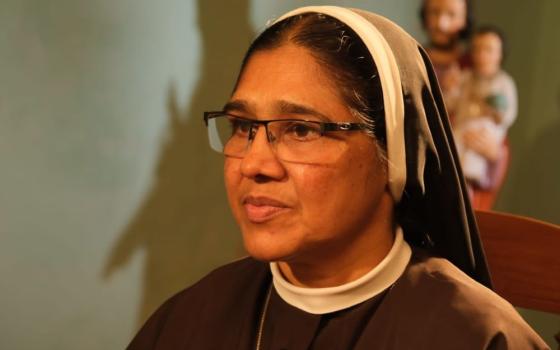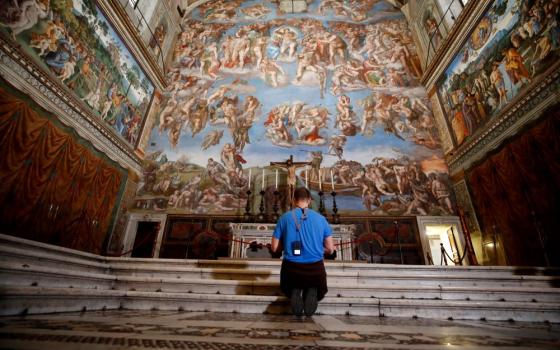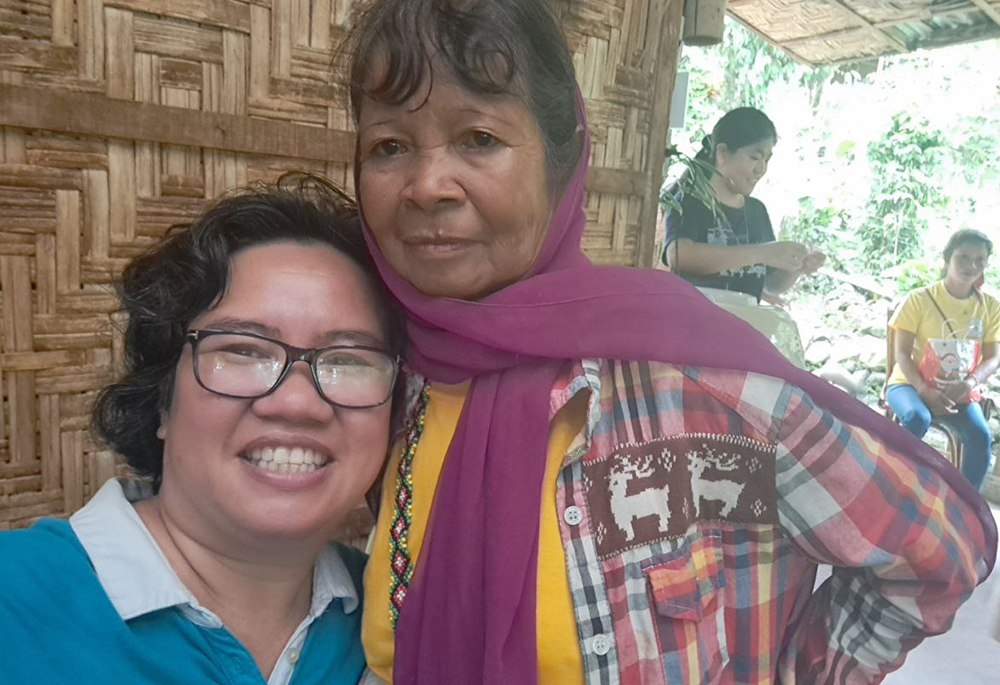
Petite Lao, left, and longtime friend Samidan, a Menubu Dulangan elder and knowledge keeper, are pictured in December 2024 in Kulamana — a remote Indigenous municipality in Mindanao, now known as Senator Ninoy Aquino in the Philippines. Lao consults her friend for education about Menubu Dulangan culture, especially their dances and stories. (Courtesy of Patricia Lourdes (Petite) Navarra Lao)

Ministry is central to the life of a sister. It is a calling shaped by prayer, community and our life experiences. Ministry is often a place where one's gifts and limits are discovered, and where the challenges and joys of service call each of us to grow deeper in our life of faith.
This month, the panelists respond to the question:
"Who or what has shaped your response to ministry?"
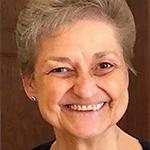
With a rich background in theology and psychology, Carrie Miller holds a master's in Christian spirituality from Creighton University and a master's in counseling psychology from Angelo State University. Initially formed with the Franciscan Sisters of Mary Immaculate, she transferred to the Sisters of the Living Word in 1980, where her passion for reflective writing and creative prayer began. Over the years, her ministries have spanned family ministry, trauma healing, ecumenical collaboration, and co-founding Families Forward, an outreach program for homeless families. After serving in community leadership from 2018 to 2023, she remains active in "extended leadership," immigrant support, environmental advocacy and spiritual direction.
A spiritually wise woman once told me: "Formation doesn't end with the profession of vows — you are committing yourself to lifelong formation." I took those words of my novice directress to mean, in part: saying "Yes!" to continuing to say "yes" over and over. Those words have rung true many times in my life and ministry. This grace of our spirituality has been a lifelong truth that continues to be a blessing and a reminder that God isn't finished with me yet!
I attribute my openness to understanding that truth to my dear parents. They lived what they believed, and I learned from what they lived:
- "Kindness to others is a given — meaningful and a joy for both the receiver and the giver."
- "See what needs to be done, and offer to help before you are asked."
- "It's important in family and friendships to be strong enough to say 'I'm sorry.' "
- " Your gifts are given to you by God to use for/share with others. Give as generously as God has."

(Unsplash/Nic Y-C)
Over the years, with the changing patterns in the kaleidoscope of life's journey and calls to ministries, that light of truth and example has continued to shine through. I have always found strength, courage for the challenges, willingness, joy and hope in the various ministries I've been involved in because I've always heard that resounding echo, "Formation is lifelong!"
Continued courses, contemporary spiritual writers, seminars, prayer, reflection on the Word, retreats, dialogue groups and community living have all been significant in my coming to know deeply that I am loved by God — the God who calls me to serve, the God to whom I have said "Yes!" to be formed for that service.
Witnessing people of integrity and service has also shaped my response to ministry. Their lives express values that I also hold dear. Their faith is a stronghold for all that life calls forth from them. They show generous, compassionate love that effects changes for the better in their corners of the world and beyond.
Those whose courage enables them to take risks and confront injustice make an impact that can be built upon. Those who treasure the voice of God to them so that God may be reflected through them — enable new life to spring forth, healing and transformation to be experienced, remedies for conflict to be discovered, justice to flower and peace to dawn.
These witnesses enable me to join their circle of service with the assurance of faith in the Holy One's longing and pledge to be with us. I am committed to serve — believing deeply, receiving openly, giving generously, reflecting the presence of a compassionate God, helping to keep hope alive.

(Unsplash/Daniel Dan)
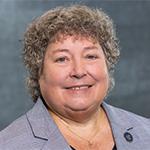
Ellen Dauwer is a Sister of Charity of St. Elizabeth of Convent Station, New Jersey, currently living in Chicago. She spent 20 years in higher education, teaching educational technology and serving in administration. She has served in congregational leadership and most recently served as executive director of the Religious Formation Conference for two terms. She is currently engaged in governance in several ministries and teaching, speaking and writing.
One of the many blessings of religious life is a deep spiritual friendship. Such was the gift of Eileen in my life that extends now into the communion of saints.
I first met Eileen in a "Ripley's Believe It or Not" moment: at a lively St. Patrick's Day dance, only to be interviewed by her the following week for a teaching position at the school where she was principal. I'm not sure she realized I was the same person she had swung around on the dance floor just days before (and I was not eager to refresh her memory!)
In the years that followed, we shared life in community and ministry while navigating the dual roles of peer and subordinate. I was fresh out of the novitiate and eager to change the world; she was an experienced master teacher and dedicated leader in an inner-city high school in Newark, New Jersey. Younger than my parents but nearly two decades my senior, Eileen became my guide in teaching, life in our community and neighborhood, and graduate school decisions. Her advice was invaluable, but her greatest gift was her steady support through six years of master's and doctoral work.
Each week, during our morning drives to school she would ask me about the class I was taking. My response would generally take up the rest of the ride as I enthusiastically recounted the content of the previous evening's class. This reinforced my learning and eventually led to opportunities to apply it. I was soon directing the purchase of the school's first computers, designing a curriculum, and leading faculty in-service sessions — all under her encouragement. It was a life lesson in believing in, trusting and nurturing the gifts of another.
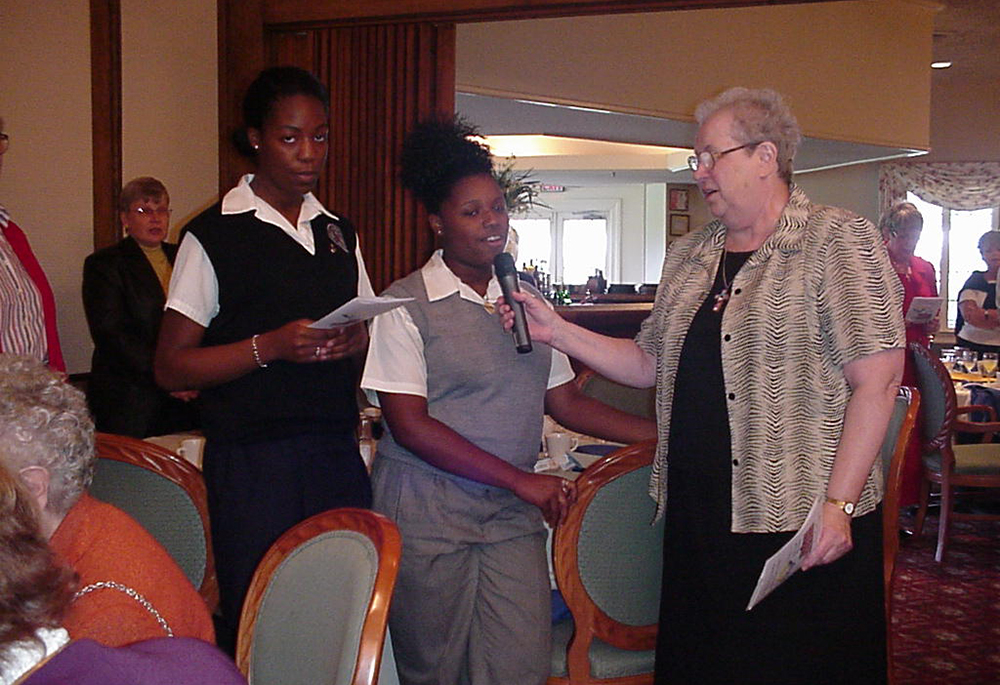
Sr. Eileen Bradshaw, a Sister of Charity of St. Elizabeth of Convent Station, New Jersey, is pictured at right in this undated photo provided by the St. Vincent Academy Development Office in Newark, New Jersey. (Courtesy of St. Vincent Academy Development Office)
Even as our ministries took us to new communities, we remained friends, reconnecting effortlessly over the years. Nearly 30 years after our first encounter, we lived together again in the same inner city convent in Newark. By then, Eileen had served as provincial, assistant general superior, and development director for our congregation. She returned to Newark to assist with fundraising in the academy she had once led.
Once again, she companioned me in discernment — this time regarding God's call to congregational leadership. The closest I could come to a "yes" was "I don't have enough reasons to say no." Eileen advised me that that was a good enough response to enter into the election process. Her guidance helped me embrace a transition from higher education to ministry with our sisters and the broader world of religious life.
Eileen was a positive role model for me, both as a principal and later as a congregational leader. She was curious, open and eager to learn from others. Her leadership style was inclusive in every way. She cared deeply about those she served but most importantly, she loved. She loved her students, the faculty and parents, our sisters and our mission, and all who are part of living it out each day. She loved people into life (as evidenced by our early morning rides to school with caring questioning about the previous night's class). She gave all that she had and poured it into a ministry and life of charity.
Advertisement
When I became congregational leader, Eileen became my mentor, helping me navigate challenges, with questions that ranged from "how to" to "why not," offering wisdom in practical and profound ways. Even as a recurrence of cancer limited her energy, our conversations remained rich, exploring faith, ministry and the future of charity in our world.
On her last night, I held her hand in our care facility, grateful for a lifetime of shared gifts.
Looking back, no one influenced my ministry more. She lent advice and gave me pointers in my early years of teaching that bore fruit in the lives of myriads of high school, college and graduate school learners. She mentored me as I learned the ropes of congregational leadership and the years that have followed bear the imprint of the hours we shared together in conversation. Most of all, she taught me to give all that I have in love to others and to nurture charity in all that I am and do. I will forever cherish the gift of friendship with Eileen and the ways in which she has shaped my life in ministry.

Karen Englebretsen of the Sisters of the Cross and Passion was born in Aotearoa, New Zealand, where her oma's secret baptism sparked her faith. At 16, she became Catholic, inspired by the sense of community. After completing teaching qualifications and traveling, she felt called to join the Sisters of the Cross and Passion, moving to Australia nearly 10 years ago. Now based in Melbourne, she serves as a spiritual care worker in the homeless sector, opening the mission house doors to each person she meets. Inspired by her foundress, Elizabeth Prout, she responds with courage and compassion to the needs of the day.
As a pilgrim on this earthy journey, I travel light. My rucksack is worn, its straps softened by time, yet within it are treasures, tools gathered along the way. There are not many, but enough. Each one whispers of encounters that have shaped me; each one carries a trace of God's surprising grace.
Etched into the fabric are the words, "Launch into the deep." Spoken long ago by Bishop Owen Dolan, coadjutor bishop of Palmerston North, New Zealand, as I stood at the threshold of religious life, they became the compass for my journey. They dared me to step beyond comfort and certainty into the restless waters where God always waits, teaching me that ministry begins where certainty ends — out in the deep, where the unexpected and the sacred intertwine.

(Unsplash/Adam Hornyak)
Another tool, tucked away like a secret smile, is the memory of youth. With a tongue-in-cheek spirit, I once joked about wanting to be a "bum." Strange, then, that God led me to the homeless sector, where this word, once used carelessly, now carries the weight of human dignity of those whose stories are written on pavements and park benches. As my days unfold in their companionship, their resilience, laughter and sorrows have schooled me far more than any classroom. God wastes nothing; even an offhand remark can become a seed of compassion.
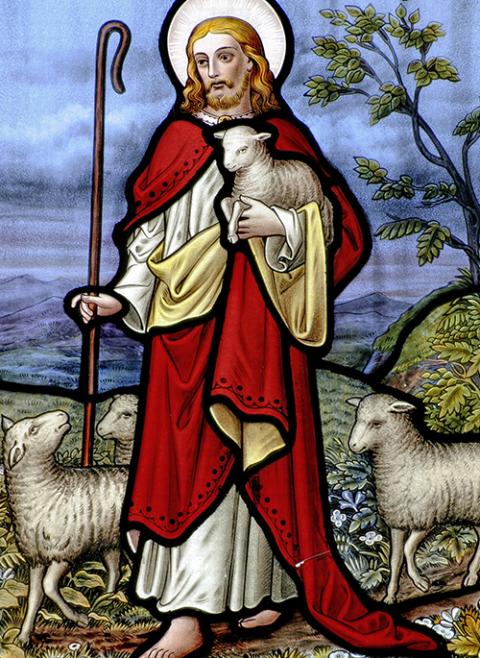
A window at St. Mary's Church in Killarney, Ireland, depicts Jesus Christ as the good shepherd. Psalm 23:1, "The Lord is my shepherd, I shall not want," is among the most popular of Scripture verses. (CNS/Crosiers)
Deep in my rucksack lies the Shepherd's staff, carved from the words of Psalm 23. It reminds me to shepherd from behind — not with control, but with quiet presence; to walk alongside another so they may find their own path; to listen before speaking, to affirm before directing; to show up faithfully, again and again, saying a name, hearing a voice, letting someone know they are seen. Shepherding from behind is not grand, yet it is sacred — the steady heartbeat of ministry.
Close at hand is another treasure: "If you are not in it, you can't change it." These words call me to be immersed, not detached. Safe distance from injustice is not an option. Institutions and organizations can wound as much as they heal, and it is disheartening to witness decisions that overlook the vulnerable. Yet it is here I am called to keep showing up, to raise a voice for the voiceless, stand in solidarity, and refuse silence. This too is ministry: the steady cry for justice that does not let go.
And so my rucksack, though light, carries what matters: the courage to launch into the deep, the humor of beginnings, the Shepherd's patient stance, the wisdom of immersion. These tools shape my steps, but the journey itself transforms me. For each path walked, each voice heard, each act of presence draws me deeper into God's unfolding mystery where love waits at each turning.

Patricia Lourdes (Petite) Navarra Lao, from the Philippines, holds a Doctor of Ministry degree from Regis College, Toronto School of Theology. She serves as the mission promoter and safeguarding lead for the Religious of Notre Dame of the Missions Philippine Region. With years of dedicated work among the Menubu Dulangan people on their ancestral land, she focuses on Indigenous rights, ecology, interfaith dialogue, and advancing digital educational technology to support her ministry. Her commitment reflects a profound dedication to fostering understanding and well-being in marginalized communities.
The ministry that has most deeply shaped me is journeying with Indigenous peoples, particularly in Kulaman — a remote Indigenous municipality in Mindanao, now known as Senator Ninoy Aquino in the Philippines. The Religious of Notre Dame of the Missions have served in this area since 1987, and through the congregation, I was privileged to become part of this mission.
Working alongside the people of Kulaman often reminds me of the words of Jesus: "There is no greater love than this — to lay down one's life for one's friends." This kind of love invites deep friendship, trust and mutual respect.
One vital lesson I continue to learn is the importance of resisting paternalism — the tendency to make decisions for others under the guise of helping, which can overshadow local leadership and wisdom. Ministry with Indigenous communities calls us to listen deeply, step back when needed and affirm the people's capacity to shape their own paths. It requires humility and openness to create space for self-determination and community leadership.
'These words remind me that authentic service is rooted in mutual liberation, where we are all transformed through solidarity and shared hope.'
—Patricia Lourdes (Petite) Navarra Lao
In Kulaman, we run a dormitory for Indigenous girls and support their education through scholarships. At first, I expected the students to follow a set timeline for completing their studies. Over time, I came to honor the truth that each learner's journey unfolds in her own time. Some students graduate later in life, having grown in confidence and purpose. Many go on to become leaders in their communities, grounded in cultural identity and vision.
Lilla Watson, an aboriginal elder and activist, is often quoted as saying at a U.N. conference in 1985: "If you have come to help me, you are wasting your time. But if you have come because your liberation is bound up with mine, then let us work together" (words credited to Aboriginal activists' group, Queensland, 1970s). These words remind me that authentic service is rooted in mutual liberation, where we are all transformed through solidarity and shared hope.
As we journey together, we open a space where dignity, hope and transformation can flourish — for their communities and for ourselves. In the end, our shared longing for the flourishing of all creation may be what truly makes us friends.
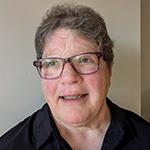
Theresa Keller has been a Franciscan Sister of Perpetual Adoration for 45 years. She holds a Doctor of Nursing degree from Rush University and a Master of Public Affairs degree from the University of Minnesota's Humphrey School. A dedicated U.S. Public Health Service provider, she has served in federally qualified community health clinics across rural Missouri, Iowa and Minnesota. Her career spans nursing education, administration and primary care, with a passion for mentoring. Currently, she works in community organizing for justice and peace and is a core member of Gamaliel's Nun Caucus.
Sometimes it is easier to reflect first on what has not shaped my ministry. I would hope that every religious agrees that institutional corporate patriarchal systems did not influence how one lives the Gospel values of ministry. Many of the rules and regulations of those structures show blatant disregard for the dignity of the human person. Early in my health care ministry, I chose to remain outside of institutional corporate patriarchal systems and focus on public service and community care. Two religious women, and my mother and grandmother were significant influences in shaping my ministry life.
My novice director, who still lives, taught me the Gospel values of ministry. She presented them to me, a very young 20-year-old, as simply "doing good work." Years later, when I heard John Lewis speak about "good trouble," I realized that "doing good work" meant the same thing. She taught me that ministry is a life of engagement for the common good.
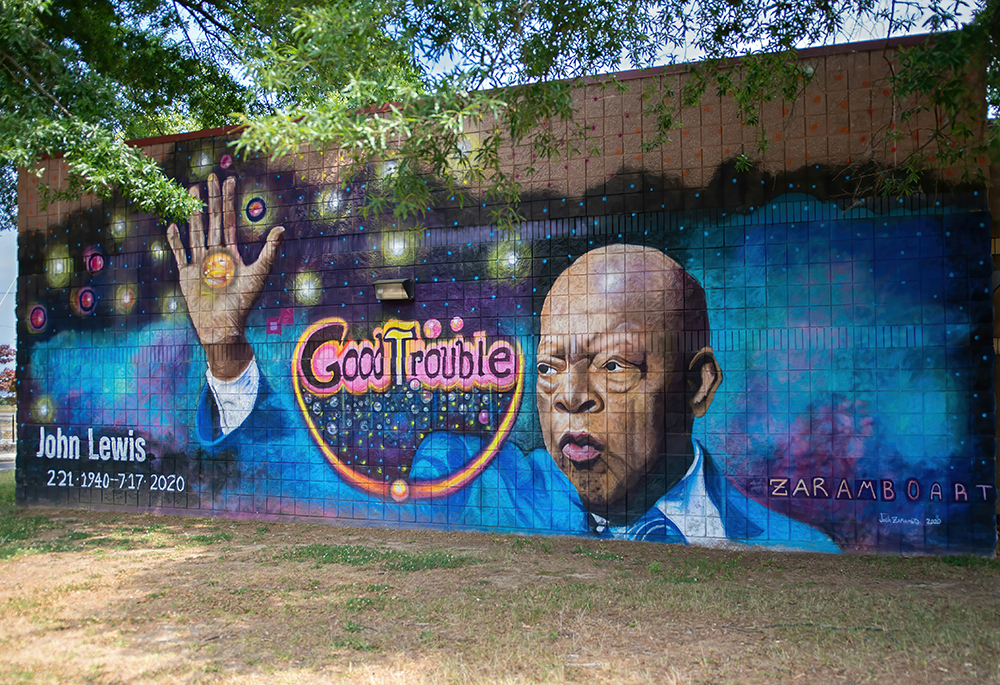
(Unsplash/Robin Jonathan Deutsch)
The other woman religious worked in health care administration and helped me secure my first administrative job in the field. She taught me the need for quality control in ministry, or maybe a broader view of ministry. She reviewed with me how many things influence ministry and how ministry can, in turn, influence many things. Many years later, I learned about her significant influence on quality planning. She was a humble woman; a trait rarely exhibited in ministry.
My mother was a joiner; she was a social person. The Gospels also portrait Jesus as a joiner, a social person. Ministry is about engaging others not only in social circles but also joining with them for the common good. She taught in an inner-city school and later changed careers to working in long-term care. She joined community and national organizations to improve the lives of others. She taught me that ministry is work, but more importantly, ministry is about who you are when you do the work. My mother's ministry was honest, loving and fun, and I have tried to bring those traits into my own ministry.
My grandmother worked for a newspaper CEO. She was a writer. She wrote letters to the editor for newspapers and magazines. Over the years of political and worldly turmoil I have taken up her ministry of editorial writing. I find putting ministry into the written word both challenging and rewarding. I hope my writing ministry is "good work" and inspires others to get in "good trouble."



